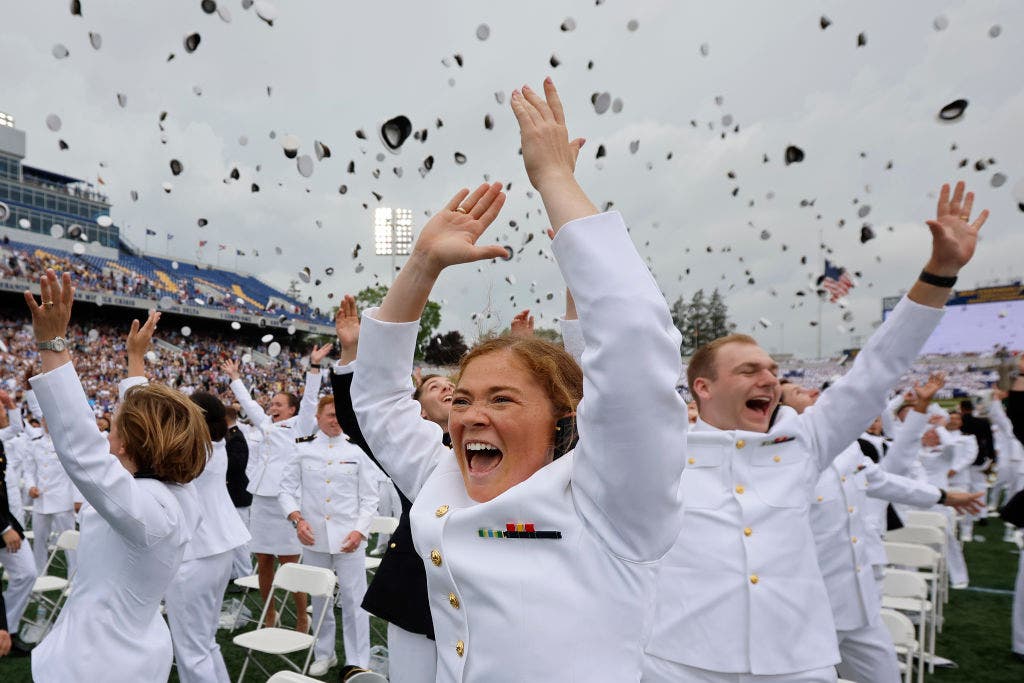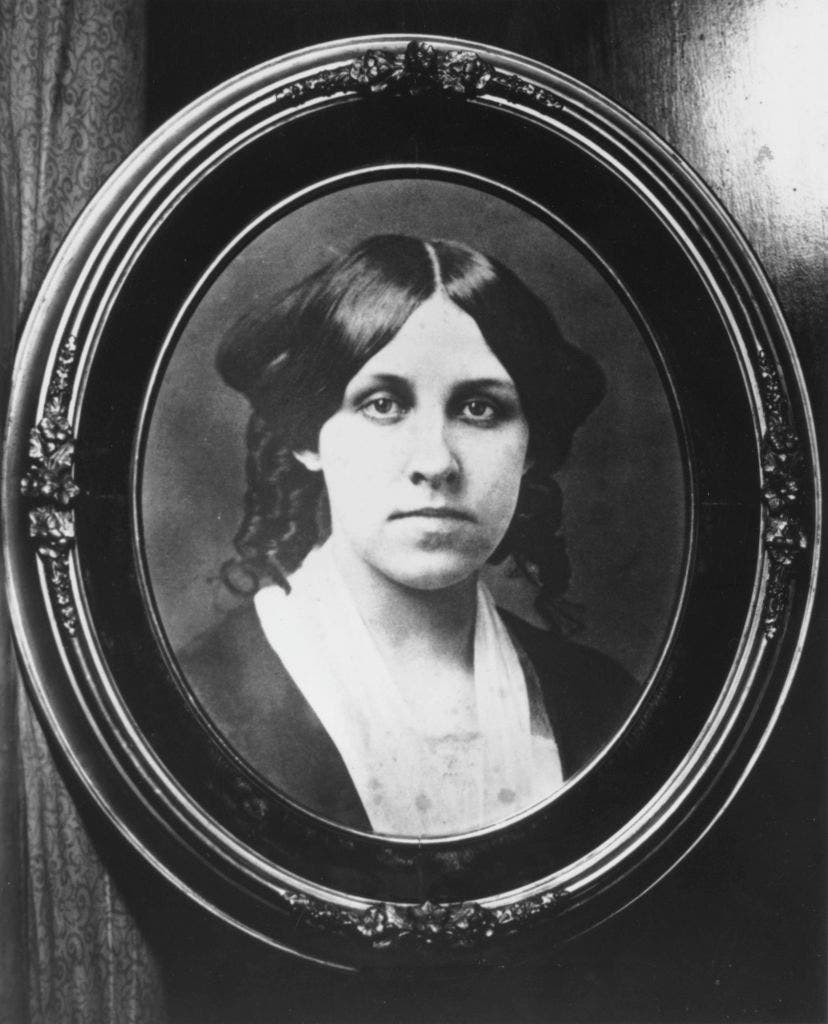The Naval School was founded in Annapolis, Maryland in the wake of a shocking scandal at sea on this day in history, Oct. 10, 1845.
The renowned military institute was renamed the U.S. Naval Academy in 1850.
The school was established following the discovery of a planned mutiny on the Atlantic Ocean aboard U.S. Navy brig Somers.
ON THIS DAY IN HISTORY, OCT. 7, 1916, GEORGIA TECH BEAT CUMBERLAND 222-0
Three sailors were executed on the high seas — including the 19-year-old son of Secretary of War John Canfield Spencer, which only elevated the national profile of the sensational incident.
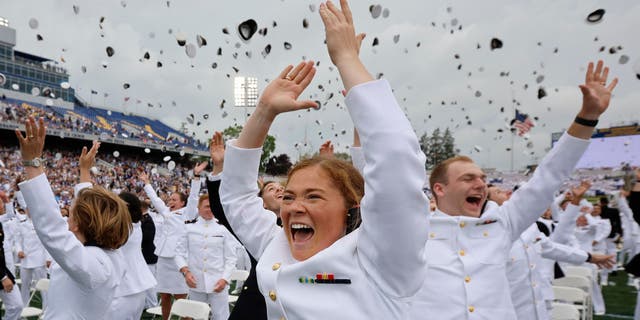
Erin Finley (front, center) of Downingtown, Pennsylvania, and her fellow U.S. Naval Academy graduates throw their hats into the air at the conclusion of their graduation and commissioning ceremony in the academy’s Memorial Stadium on May 27, 2022, in Annapolis, Maryland.
(Photo by Chip Somodevilla/Getty Images)
The ship departed New York in September 1842, destined for West Africa, on a training mission with teenage volunteers who were considering a career in the Navy.
“Discipline deteriorated on the Somers and it was determined by a court of inquiry aboard ship that Midshipman Philip Spencer and his two chief confederates, Boatswains Mate Samuel Cromwell and Seaman Elisha Small, were guilty of a ‘determined attempt to commit a mutiny,’” reported the U.S. Naval Academy in its online history.
‘FLORIDA STRONG’ T-SHIRT AD REJECTED ON FACEBOOK: ‘EVERYONE LOVED THESE SHIRTS’
“The three were hanged at the yardarm and the incident cast doubt over the wisdom of sending midshipmen directly aboard ship to learn by doing. News of the Somers mutiny shocked the country.”
The U.S. Naval Academy was established following a planned mutiny on the Atlantic Ocean aboard U.S. Navy brig Somers.
The Somers remains the only ship to suffer mutiny in the history of the U.S. Navy.
Captain Alexander Slidell Mackenzie ordered the executions without trial by court-martial.
The accusations of insubordination and swift hangings made obvious the need for a rigorous program of educating and training America’s best and brightest to become professional Naval officers.
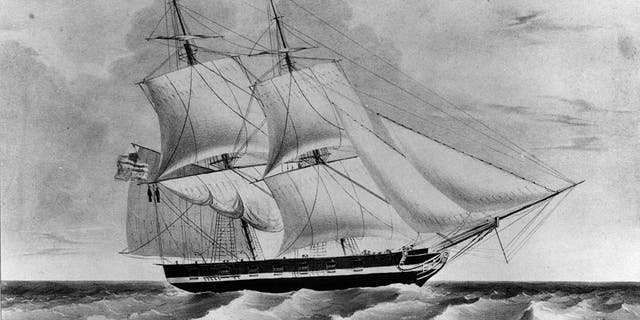
The U.S. brig-of-war Somers, which experienced a mutiny on her return voyage from the African coast in 1842. The hanging of the three ringleaders, Philip Spencer, Samuel Cromwell and Elijah Small, from the yardarm brought a quick end to the mutiny. It remains the only mutiny in U.S. Navy history. Original artwork printed by Nathaniel Currier.
(Photo by MPI/Getty Images)
“Secretary of the Navy George Bancroft established the Naval School at the former Fort Severn … with a class of 50 midshipmen and seven professors,” reported the American Battlefield Trust this year.
The school was created, the Naval Academy noted, without congressional funding.
CLICK HERE TO GET THE FOX NEWS APP
Added the Battlefield Trust: “The initial curriculum involved two years of study in mathematics, navigation, gunnery, steam engineering, chemistry, English, natural philosophy and French. Five years later, the Naval School became the Naval Academy, with a full four-year course of study augmented by summer training at sea.”
The Naval Academy has since its founding produced an impressive list of high-seas heroes, space explorers and global leaders.
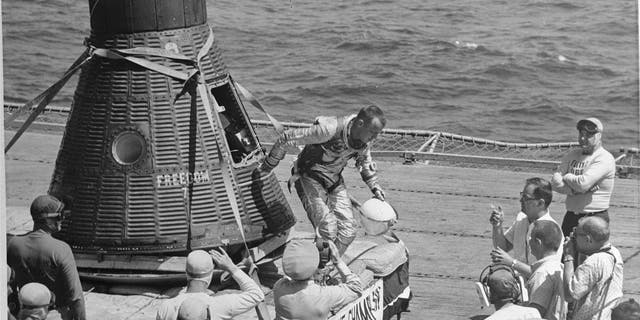
American sailor and astronaut Alan B. Shepard (1923-1998) as he emerges from the Freedom 7 space capsule onto the flight deck of the recovery carrier USS Lake Champlain (CV-39) after his historic Mercury 3 flight, Atlantic Missile Range, May 5, 1961. Shepard became the first American in space and also became the first human to return to Earth in his spacecraft, as Soviet cosmonauts had parachuted during re-entry.
(Photo by CBS Photo Archive/Getty Images)
Among its most notable graduates are Fleet Admiral Chester W. Nimitz, who commanded the U.S. Navy in the Pacific, the largest battle fleet in human history, in World War II; President Jimmy Carter, who enrolled at the academy in 1943 at the height of the war; and NASA astronaut Alan Shepard, the second human and first American to travel into space.
The school has produced five chairs of the Joint Chiefs of Staff, nine Marine Corps Commandants, 54 astronauts and 73 Medal of Honor recipients.
Mutineer Midshipman Spencer, whose brazen insubordination led to the creation of the academy, “was conspiring with some twenty members of the crew to seize the [Somers], murder her officers and engage in piracy,” the Naval History and Heritage Command noted.
Three mutineers, including the 19-year-old son of Secretary of War John Canfield Spencer, were executed by hanging at sea.
It added: “Midshipman Spencer’s general reputation was not particularly good and he was known … to have done a number of things harmful to the discipline of the ship.”
CLICK HERE TO GET THE FOX NEWS APP
Captain Mackenzie was a noted author and historian who counted among his friends celebrated 19th century author Washington Irving.
Mackenzie was personally scandalized by the incident and faced outrage over his decision to execute three sailors without trial. He was acquitted by court-martial in 1843 and continued to serve the Navy until his death in 1848.






